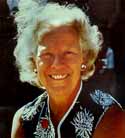Developing a Rational National Approach to Issues Affecting Volunteers
We have been privileged to travel internationally during the past few years, which gives us a very different perspective on volunteerism than anyone working only in their home country. Unfortunately, we admit to being close to despair about what is - or, rather, isn't - happening in the United States right now, particularly in comparison to other countries. The total lack of interest by the American federal government in the International Year of Volunteers is only one indicator of the problem, but before we simply complain, we need to determine exactly what we need and want from government to assist in our efforts to promote volunteering.

